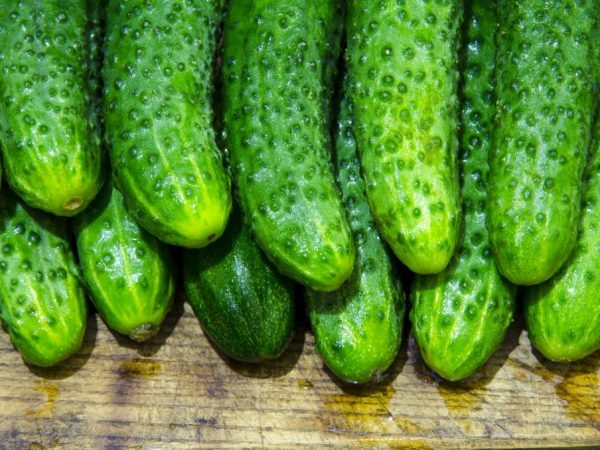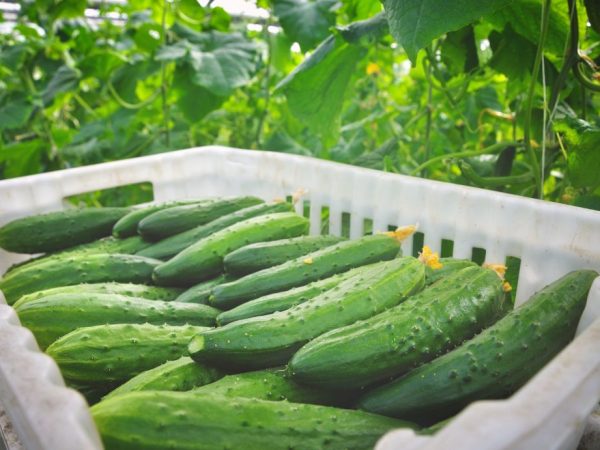Why cucumbers grow bitter
At the end of the gardening season, many summer residents wonder why cucumbers are bitter. Even with the right care, gardeners are faced with the fact that they get the wrong quality of vegetables that they would like. There are a number of reasons why bitterness appears in cucumbers, however, timely measures taken make it possible to create such conditions to avoid this.

Causes of the Bitter Taste of Cucumbers
Source of bitterness
In appearance, a bitter cucumber cannot be distinguished from a crunchy sweet, which should have grown a real fruit. An unpleasant bitter taste becomes noticeable only when you eat cucumbers. The source of why cucumbers taste bitter is a special substance found in vegetables called cucurbitacin. There is a lot of this inherently toxic element in green plants, because the substance serves to protect young fruits from pests attacking them.
Cucurbitacin is produced and present in all types of vegetables, foliage, stems and fruits. But in order for the cucumbers to become bitter, it is necessary to exceed its concentration.
Causes
Let's highlight the common reasons why cucumbers are bitter:
- insufficient humidity in closed greenhouses,
- low temperature of water used for irrigation,
- lack of potash and nitrogen elements in the soil,
- an excess of sunlight or a lack thereof due to excessive thickening of the plantings,
- lack of moisture or waterlogging of the soil, as well as a violation of the regularity of watering,
- pre-planting diseases of cucumber seedlings,
- planting seeds collected in the back of vegetables.
Bitterness in greenhouse vegetables
Those varieties of cucumbers that are intended to be grown only in closed greenhouses are considered rather capricious plants. They do not like a lot of sunlight and cannot stand the heat, and here summer residents make a common mistake, placing greenhouses exactly where the sun shines all day.
With the existing differences from a hot day to night cold, the cucumber culture is exposed to significant stress, and this becomes the reason why the cucumbers begin to taste bitter.
The main factors for increasing the concentration of cucurbitacin in greenhouse-grown cucumbers are:
- limitation of living space by the construction of the greenhouse, due to which the plants cannot grow freely and entangle and damage the whips,
- exceeding the penetration of sunlight through the walls of the greenhouse,
- airing with a significant difference in humidity and air temperature inside and outside the greenhouse,
- missing humidity level in the greenhouse,
- incorrectly selected temperature regime during the period of active growth, which at the initial stage cannot be above 18 ° at night, and above 20 ° during the daytime, and at the fruiting stage should not fall below 28 °,
- insufficient fertility of the soil and the low content of components necessary for vegetables in it, nitrogen and phosphorus must be present without fail.
Bitterness in the open field
Why are cucumbers bitter when grown outdoors? The same reasons provoke a bitter taste in cucumbers as in greenhouse conditions, however, there are a number of additional reasons:
- the plants receiving a large amount of sun, which is much higher than that of greenhouse plants, leads to the appearance of a flavor,
- irregular watering or unheated water is another reason why bitter cucumbers are obtained in open conditions,
- sudden changes in temperature in open outdoor conditions affect the plant more than when grown in a closed greenhouse, and this increases cucurbitacin,
- sowing seeds on low-equipped beds, which heat up worse and are more exposed to temperature changes,
- the location of the cultivated areas for cucumber crops near raspberry, strawberry and blackberry bushes, which in agricultural technology are considered aggressors who take useful elements along with water from the soil, becomes a factor provoking a bitter taste.
Solution to the problem

The taste of cucumbers can be influenced
Although they say that bitter cucumber fruit is more useful than sweet, not everyone is ready to put up with the characteristic taste. Given the reasons that lead to bitterness in cucumbers, a number of activities can be carried out.
Landing place
A correctly chosen place for planting a cucumber means that the beds in the open ground or in the greenhouse should be where there is not direct, but diffused sunlight. Many summer residents successfully use the shade from corn or from the branches of trees on the site, cover the beds with spunbod and paint over the walls of the greenhouse with chalk solutions.
Also, when growing cucumbers in the open field, it is important to correctly select their plant neighbors, which would not take mineral nutrition and all the liquid from the soil.
Suitable soil
It is recommended to grow cucumbers so that the fruits do not have bitterness, it is recommended on loose earth or peat diluted with ash, which reduces acidity. Clay soil is not suitable for cucumber crops.
Watering
Regular watering is a guarantee of sweet fruits, since the alternation of an excess with a lack of moisture causes serious stress in the plant and leads to an increase in the concentration of cucurbitacin and, as a result, the appearance of a bitter taste. In addition, it is necessary to water the cucumber bushes with water warmed to room temperature.
Maintaining the necessary moisture in the ground allows mulching the beds and loosening the soil.
Climate
Excessive heat with dry air leads to the appearance of bitterness in the fruit. As well as too cool conditions. During the period when the temperature drops, the greenhouses are not opened so as not to create stress ventilation for the heat-loving culture, and cover materials are used on the street against the cold. For vegetables grown on open soil, canopies are made of white material during hot times of the day, and mirror reflective films are created for greenhouse plants.
Mineral nutrition
Proper fertilization of the soil will provide the plants with all the necessary nutrients and prevent bitterness in cucumbers. It is forbidden to introduce fresh organic matter, including fresh manure, which provokes the release of bitterness in vegetables.
Varieties
Today, varietal varieties have been bred that, even if the rules of agricultural technology are violated, will not give bitterness. These cucumber varieties do not accumulate cucurbitacin, which results in a bitter taste in vegetables. Among such species are Khrustik, Ant, Egoza, Courage and others.
How to remove bitterness
If it was not possible to cope with agricultural technology, and as a result, you still got a harvest of bitter cucumbers, you can resort to some little tricks of summer residents who advise what to do with bitter cucumbers.
- So, only the skin of vegetables is bitter, therefore the easiest way to get rid of unpleasant bitterness is to simply cut off the peel and use the extremely sweet part for consumption.
- It happens that the main bitterness in cucumbers is present only in the tail. Then you can make the cucumbers suitable if you cut off about 1.5 cm and rub the cut area until all the white matter comes out. After rinsing with water, the cucumber can be eaten.
- The most famous popular way to remove bitterness from cucumbers is to soak vegetables or subject them to heat treatment. When soaked and heated, the cucurbitacin in vegetables collapses, and the bitter taste disappears. It should be soaked for at least 12 hours, preferably for a day, periodically changing the water.
If the grown cucumbers are bitter, more often summer residents use them for home canning: they make them lightly salted and prepare salads with them or roll them up.


